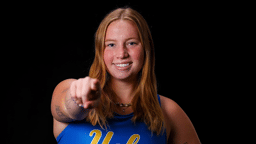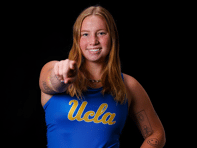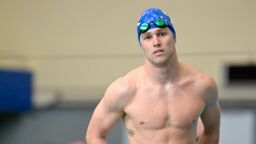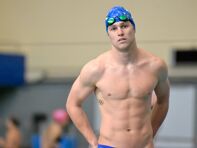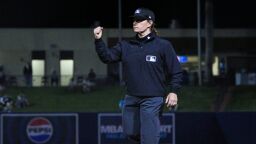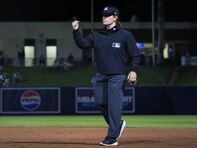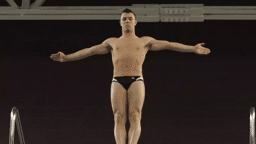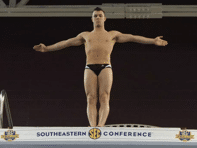On a sunny day in Houston last October, the National Women’s Soccer League’s Western New York Flash completed the biggest upset in the young league's history.
Having already taken down the league-leading Portland Thorns in a dramatic semifinal, they beat the dominant Washington Spirit in a penalty shootout to take home the championship trophy. It was a breakout season for the young Western New York side, the lowest-seeded team coming into the playoffs.
According to Taylor Smith, a rookie in the 2016 season — and an openly gay athlete — the win surprised even the Flash themselves.
"No one expected us to even make the playoffs," she said. "Then to take down [the Portland Thorns] in the semifinal, who we hadn't beat all season, and play down to the last second in the final — it felt great."
A scant three months later, the Flash moved to North Carolina and became the Courage. The move was condemned by some observers, who decried the anti-transgender legislation in place in the state.
While Smith says that her time so far in North Carolina has mostly been positive, being close to the center of the HB2 controversy has served as a reminder that there's still a lot of work to be done.
"It kind of keeps us in check," she says. "There are still a lot of people who don't have rights, and we try to use our small platform in a positive way."
A forward at UCLA and on her club team before that, Smith has played at fullback this season for the reigning NWSL champions, a new role for the 23-year-old. Though she says she wasn't totally comfortable in that position the handful of times she played it last season, she's grown into it in 2017, becoming a key piece in North Carolina's league-leading defense.
The timing couldn't have been better for Smith, who earned her first cap for the senior national team against Australia in July. On a team overflowing with talent higher up the pitch, the speedy Smith has fit into the national team lineup in the same position she plays for the Courage — as an attacking fullback with the pace to fulfill both offensive and defensive responsibilities.
"I think getting that call changed my whole perspective," Smith says of her first stint with the national team. "Last year I was a sub off the bench [for the Flash]… Getting the call gave me a lot of confidence. It relit a fire in me to get better. This is what I want to do."
Smith says she's known she was gay her whole life, and she's been out in her personal life since the end of high school. But it wasn't until August that she discussed her sexuality publicly, in a nine-minute Youtube video.
In it, she talks about learning to accept herself growing up in a close-knit community in Texas. Smith, who is black, remembers wanting to hide being gay in order to fit in at her predominantly white school.
"I think back to the younger me," she says in the video, "and I wish I could tell her, 'everything works out.' "
"I didn't expect it to get a lot of views," she says (it's now the most-viewed video on her channel). "It was pretty cool that people took the time to listen to me and hear my story."
In 2017, the question of coming out for athletes in the public eye remains complicated. The public coming out has a very different meaning than it did even a decade ago, especially in women's sports, where being gay is more widely accepted than it is for men.
Although growing acceptance for people in the LGBT community means less risk to careers and reputations, there's also the sense that it shouldn't matter. With fans at every game wearing rainbows, and most women's teams, including the Courage, hosting Pride events, why bother? There's also, of course, the understandable desire to keep one's private life private.

For Smith, though, the decision wasn't difficult. "I just thought about the younger me — if I saw somebody I looked up to come out and be true to who they are, it would've meant so much to me."
"If I helped even one kid, it was worth it."
Smith's openness puts her at the convergence of several social and political issues. Not only does she live in a state mired in controversy over anti-LGBT legislation, but the first line of her Instagram profile is two symbols many see as incompatible: a cross followed by a rainbow flag.
“I know God loves all his children. … The message God wants to send, is to love one another.”
But Smith doesn't see a contradiction.
"I know God loves all his children. The message of Christianity, and the message God wants to send, is to love one another," she says.
That's not to say learning to reconcile her faith with being gay was easy. Although "no one's directly confronted me about it," she says, "it's something I battled with for a while … but I wholeheartedly believe in Christ, and I know he loves me."
As she's gotten older, Smith says her teammates have been crucial allies. "June was Pride month, so we had the [equality] shirts. To see so many of my teammates grab one, and know I have the support of the people I'm around day to day, was pretty cool."
That support is what Smith hopes to pass on to fans. She calls her platform small, but in the age of social media, it can still make a difference. If there's one message she wants to convey with that platform, it's this:
"The game is for everyone. No matter who you are, you have a place in this world."
Taylor Smith can be followed on Instagram, Twitter and YouTube.
Katelyn Best is a writer and journalist in Portland, Oregon. She covers the Portland Thorns for Stumptown Footy, and her work has appeared in Portland Monthly, Excelle Sports, ESPNW, and elsewhere. She can be reached via her website: kabest.me or on Twitter: https://twitter.com/BestKabes







